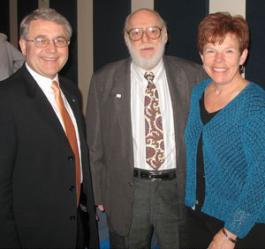Pumpian Lecture Focuses on World’s Imbalance of Pharmacists
Manasse says global vision needed to improve pharmacy training and care.

By Jeffrey Raymond
March 16, 2007
Tackling the challenges facing the pharmacy industry in Maryland, or the mid-Atlantic, or even the United States, isn’t good enough for Henri Manasse Jr., PhD, ScD, who delivered the Paul A. Pumpian Lecture at the School of Pharmacy on March 6.
In his presentation “International Perspectives on Pharmacy Education,” Manasse, executive vice president and chief executive officer of the American Society of Health-System Pharmacists, told students and faculty members that the World Health Organization (WHO) has recognized the global shortage and imbalance of pharmacists, and has committed itself to help resolve the problems.
American pharmacists would scarcely recognize the market conditions under which pharmacists work in other countries, he said. Around the world, flight from war and the promise of better job opportunities are sending people from rural areas into cities. And, as people in the cities become educated, they are migrating to more developed areas of the world to pursue more opportunity. These and other factors result in a global imbalance in the need and availability of pharmacists and other health care providers. Manasse noted that WHO found a worldwide shortage of more than 4 million health care providers, mostly in sub-Saharan Africa and Southeast Asia.
Manasse described a “global vision” of a pharmacy industry that better serves communities and patients, but warned, “It takes an immense amount of thinking and planning and resources and energy.” The good news, he said, is that the world’s health and pharmacy organizations have embraced a “framework for a global vision of pharmacy education” to guide the industry and politicians over the next decade.
The framework includes seven “domains” for global action, including preparation of pharmacists for practice, quality assurance in pharmacy education, academic/faculty work force development, preparation of pharmacy technicians and assistants, and advocacy for pharmacy education and health care work force development.
Manasse said the dialogue on changing the global framework of pharmacy education should include how developing countries train pharmacists. For example, he said, Mexico and India, which have sophisticated drug manufacturing facilities, train pharmacy students better in drug production than in being good community pharmacists.
